On October 15, 2021 SLLS filed an intervention in a foreclosure action by Fannie Mae against five multifamily rental properties owned by LLC's controlled by Joshua Bruno of Metrowide Apartments. The purpose of the intervention is to support Fannie Mae's action to have the properties transferred to a third-party management company. SLLS's clients urge the Court to enforce the appointment of a new management company because the properties present imminent health and safety concerns due to years of deferred maintenance and mismanagement.
You can read the petition here.
A selection of photos included in the petition are below:
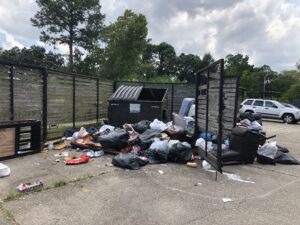

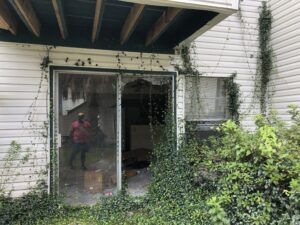
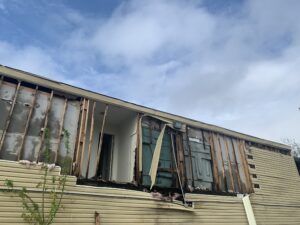
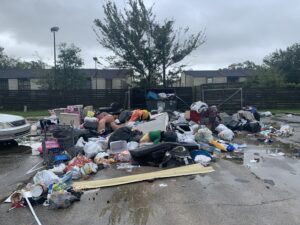
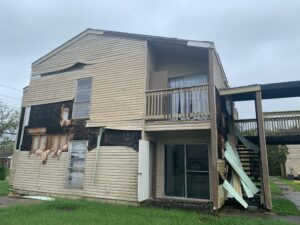
You have a right to fight charges on your bill from Entergy that are wrong.
How do I tell Entergy if I think there’s a mistake on my bill?
Report the problem with your bill as soon as you can.
Do not wait.
You could lose some of your rights if you wait too long to report a problem with your bill.
Contact Entergy’s Customer Service Department to report the problem with your bill.
Entergy Customer Service hours are Monday through Friday from 7:00 a.m. to 7:00 p.m.
You can call Entergy at (800) 368-3749.
You can reach Entergy online at: https://www.myentergy.com/s/support.
What happens after I tell Entergy about my billing problem?
Entergy will give you a reference number for your complaint.
An Entergy Customer Service Manager should review your complaint.
Entergy may fix the problem at that stage.
You may get a written decision from Entergy by certified mail.
What do I do if I disagree with Entergy’s decision?
Do not delay in taking your issue to the next level if you do not agree with Entergy’s written decision.
Do not miss the deadline to challenge Entergy’s written decision.
You must fill out and file a form to make your formal complaint.
Get the form from the Utilities Regulatory Office of the New Orleans City Council.
The office is at Room 6E07 of City Hall.
The phone number for the Utilities Regulatory Office is (504) 658-1110
Be careful when you fill out the form.
Be sure to include any other papers or other things you need for your complaint.
File your form and related materials by the deadline.
You can bring the form and any other related papers in person to the Utilities Regulatory Office.
You can send in the form and related papers by fax.
The fax number for the Utilities Regulatory Office is (504) 658-1117.
Again, you must file your written form within 10 days of you getting Entergy’s written decision:
Your written form must include certain information or you may lose.
Entergy should get notice of your complaint within three (3) business days. .
Entergy gets 3 business days to reply.
A Complaint Officer will review your complaint.
The Complaint Officer will decide if your complaint gets an Administrative Hearing.
I was given an Administrative Hearing, now what?
Different things can happen at the Administrative Hearing level,
The Complaint Officer for your complaint can offer a settlement.
You and Entergy will have to agree to the settlement.
If you and Entergy do not work things out, the next step is a hearing.
You will get notice of the hearing.
The notice should tell you the date time and place of the hearing.
The hearing should happen in 20 to 30 days.
Hearings are during regular business hours.
Regular business hours for hearings are between 9:00 a.m. and 5:00 p.m., Monday through Friday.
Hearings normally take up to 1½ hours.
If you do not show up for your hearing, you can lose.
Your complaint may be tossed out.
What happens after a hearing?
You will get a hearing decision in writing.
You should get the written decision within 15 calendar days after the hearing.
The decision will say what the Complaint Officer decided about the dispute.
The decision will say if the Complaint Officer found your rights were violated.
The decision will say if the Complaint Officer found that Entergy broke any regulations.
The decision will give reasons for the Complaint Officer’s findings.
The decision will say what can be done to fix the problem.
The decision will say if there was an agreement to fix the problem before or during the hearing.
The decision will spell out the terms of any agreement reached to fix the problem. .
Sometimes problems are fixed by setting up a monthly payment plan.
The amount due under a payment plan would be on top of your regular monthly bill.
What if I do not get an Administrative Hearing?
Some things can stop you from getting a hearing.
These things can include:
Disputes that do not get hearings can include:
Here is more information about utility complaints and appeals. Review the information at the link below carefully.
https://cdn.entergy-neworleans.com/userfiles/content/docs/Customer_Rights.pdf
A “pay day loan” is a name for a loan that must be repaid very quickly, usually within weeks.
This kind of loan goes by many names.
These loans may be called “pay day” loans, “cash advance” loans, “check advance” loans, “deferred deposit” check loans, or “deferred payment” loans.
Here is how these short term loans work.
The loan is paid back from your upcoming paycheck.
You usually let the lender to take the loan amount out of your bank account when it is time to repay the loan. This is often 14 days after the loan.
Under Louisiana law, the most you can borrow $350.
The length of the loan is up to 30 days.
Pay day loans will not help with long-term debts.
Instead, pay day loans often turn an immediate problem into a n even more expensive long-term problem.
Louisiana law allows you to be charged $20 for every $100 you borrow.
The lender can also charge you fees. These fees can include a $10 documentation fee. The fees charged can be at most $55 when you borrow $220 or more.
The APR (Annual Percentage Rate) for these loans in Louisiana is up to 391% on a loan of $300. APRs for most credit cards between 12% and 30%.
APR is the interest rate showing the true and total cost of the loan. It includes the interest rate plus any upfront costs and fees that you are charged by the lender when you borrow the money.
Yes and No. Under Louisiana law, only if you pay the fees owed and pay back at least 25% of the borrowed amount, you can refinance the remaining 75% of principal.
For example:
You borrowed $300, and you were charged $55 in fees.
You must pay back $55 in fees plus $75 (which is 25% of the $300 you borrowed) to refinance the remaining $225 owed.
You will be charged additional fees and interest for the $225 you refinanced.
The law allows you to make a “partial payment” of $50 or more.
If you do not pay by the due date, you will be in default.
The lender can then charge you up to 36% per year interest for the first year.
After the first year the lender can charge 18% interest each year after until the full amount owed is paid back.
If you are sued the lender can charge you attorney fees and court costs.
Only police, sheriffs, or a District Attorney can charge you with a crime.
A payday lender may threaten criminal charges if you do not pay.
You do owe a debt to the payday lender.
But in Louisiana it is rare for the police, sheriff, or district attorney to charge someone with a crime for not paying back this kind of loan.
The lender can now charge you a $25 NSF (“Not Sufficient Funds”) fee and any fees the lender charges for processing the bad check.
More information can be found at: https://www.consumerfinance.gov/consumer-tools/payday-loans/
You have the right to fight mistakes on your Sewerage and Water Board (SWB) bill.
How can I tell SWB if I think there is a mistake on my bill?
There are 4 ways to tell the Sewerage and Water Board (SWB) when you think there is a mistake on your bill.
1. You can call the Sewerage and Water Board to tell them about the mistake
The phone number is (504) 529-2837.
SWB Customer Service is open Monday through Friday from 7:00 am to 7:00 pm.
2. You can send an e-mail to SWB about the mistake on your bill
The website for SWB is www.swbno.org.
Go to Customer Service.
Pick Email the Customer Service Department.
3. You can send a message by Fax to tell SWB about a mistake on your bill.
The fax number for SWB is (504) 585-2455.
4. You can write to SWB by mail to tell them about the mistake on your bill.
Here is the mailing address for SWB.
Sewerage and Water Board of New Orleans
Mail Resolving Department
625 St. Joseph Street
New Orleans, LA 70165
What happens after I tell SWB about the mistake on my bill?
Keep paying your SWB bill the amount you are usually billed.
That means your regular bill amount before the bill that had the mistake you are complaining about.
SWB should tell you that it has your complaint.
SWB should let you know that they are looking at your complaint to see if there is a mistake on your bill.
SWB will mark the bill you complained about “under investigation.”
SWB should send you a letter every 30 days during its investigation.
SWB’s Bill Adjustment Department will do the things listed below.
Check your past 12 months of water use to see if it is in the normal range.
If water use does not look normal, SWB will tell the SWB Meter Reading Department to check the meter where you live.
Here is what happens if SWB needs to check to make sure the meter is working correctly.
SWB’s Meter Reading Department will call you to set up appointment to inspect your meter.
You should be there when SWB comes to check the meter.
SWB’s meter checker should take down information about the meter and how it is working, and give this information to SWB for its review of your complaint about your bill.
What does SWB label as “normal” water and sewer use?
SWB looks at the average of the 2 most recent actual meter readings before the change.
SWB will label any use above that average amount “excess” use.
What happens if investigation not finished by my next bill?
Your new bill will tell you if the investigation is still going on.
If the investigation is not finished, the amount due on your bill is only for that month’s usage and you should pay it.
You do not have to pay the disputed charges when you get your new bill.
Keep paying your regular monthly bills until the investigation is finished.
What happens during this investigation if I think my new monthly bill is still not correct?
Contact SWB to ask that these new charges be included in your open investigation.
Remember that you must pay what you think the regular month’s charges should be.
What happens when the investigation is done?
SWB will send you a letter when the investigation is over.
The letter may say there was a leak and that you must fix the leak.
The letter may say there was the kind of leak that SWB must fix.
The letter may say SWB cannot find a reason for the high bill.
Here is what happens if SWB says it is up to you to fix a leak.
SWB’s letter will tell you there was a leak on your property.
It is up to you to fix leaks on your property.
You should hire a licensed plumber to fix leaks.
Make sure the licensed plumber gives you a written report of all repairs done.
Keep this report.
Keep proof of what you paid for the repairs.
Write to SWB with proof of the repairs.
SWB will review and once a meter reading shows normal water usage, they will adjust your balance. For leaks that were above ground they will take off up to 50% of the extra billing, For below ground leaks they will take off up to 100% of the sewer and up to 50% of the water extra billing.
Here is what happens if SWB says it is SWB’s job to fix a leak it found.
SWB’s letter may say that there was the kind of leak that SWB must fix.
SWB will cancel the 100% of the sewer and water charges for a leak that SWB had to fix.
Remember that SWB will only cancel the above normal or “excess” billing from a leak that it was SWB’s job to fix.
Here is what happens if SWB cannot find a reason for the high bill.
SWB’s letter will say if it could not find what caused the high bill.
If no reason was found AND the bill was high for only one month, SWB will reduce your bill to your normal bill amount.
What happens if my monthly bills still are higher than normal usage?
Contact SWB immediately.
You should also get notice from SWB to check for leaks.
What if I don’t agree with the findings of the investigation?
If you disagree with the findings, you can ask for a hearing with SWB’s Administrative Hearing Officer.
Contact Customer Service at (504) 529-2837.
Learn more on the SWB site:
https://www.swbno.org/CustomerService/BillDisputeAndAdjustments
Can I get my security deposit back if I break my lease because my unit was destroyed by a hurricane or other Act of God?
If your unit was damaged enough to be unfit to live in because of a hurricane or other “Act of God” you may be able to end your lease early.
If you have the right to break your lease, then you should be able to get back your security deposit. But your landlord can keep money out of your deposit for damage beyond “normal wear and tear” that you let happen to the unit.
Use this link for more information on whether the damage to your unit makes your unit unfit before you decide to break your lease and move. If that information is not enough for you to make a decision, try to get help from an attorney as soon as you can.
The amount the landlord would keep is for damage that happened before the hurricane or other Act of God. The amount the landlord keeps could be for fees or rent that you owed before the hurricane or other Act of God.
You could have an issue getting some or all of this money back if hurricane damaged items that you or your guests had also damaged.
Example: someone in your house damages a wall before the hurricane. Then the hurricane ruins that same wall. Some courts might decide that you owe for the damage you caused to the wall before the wall was ruined by the hurricane.
What should I do if I have to end my lease early because of the hurricane damage or other Act of God?
If you want to get out of your lease because a hurricane or other Act of God made your place unfit to live in, you need to tell your landlord in writing that you are ending your lease early.
Write down that you are ending your lease early because your place was destroyed or is unfit to live in because of a hurricane or other Act of God.
Take good pictures of the unit. Take pictures that show what kind of shape the unit is in. Write down how the destruction made your place unfit to live in. Give specific examples of things that make your place unfit to live in.
When you write to your landlord to end your lease it can help to send pictures of the damage to your place. You can use a text message or email.
Also be sure to keep any pictures you have of your place from the time before the disaster. Those pictures would show the damage was from the disaster, and not your fault.
Contact a lawyer if your landlord sues you later for ending your lease early, or if your landlord reports a debt to credit agencies.
How do I get my security deposit back if I move out because my unit was destroyed by a hurricane or other Act of God?
After you are completely out of your unit, turn in the key or tell your landlord in writing where you left the key. Text message or email works for this.
Be sure to take all of your own things with you when you leave.
Clean up anything you changed in the unit as best as you can. Throw away any your trash or things you are not taking with you.
Take pictures and videos to show what shape the unit was in when you moved out. Tell your landlord in writing that you are willing to do a walk-through inspection of your unit with your landlord. If your landlord tells you, but not in writing, that they will not do a walk-through, send them a text, email, or letter saying that you understand they do not want to do a walk-through inspection. This way you have something in writing about it.
Once you are out of your unit and returned your key, you need to tell the landlord in writing that you want your deposit back. You must include a forwarding address where the landlord can reply or send you the refund.
The forwarding address you give the landlord does not have to be your actual address. The address can be any place where you can receive mail.
It is best you send this demand letter to your landlord on the same day you return the keys.
If you can, use certified mail, return receipt requested, to send your security deposit demand letter. This can help you show that your landlord actually got the letter.
If you cannot send the letter by certified mail, send a text message or email message with the same information that is in the letter you mail (a request for the deposit and a forwarding address) may be acceptable here.
Your landlord has 30 days from the day he or she gets your letter to return your deposit or to tell you in writing why he or she is keeping all or some of the deposit.
If your landlord does not respond to your written demand for a security deposit refund within 30 days of getting your letter, then he or she has “willfully” failed to return your deposit. That means you may have the right to get back three times the amount of your deposit.
After the 30-day period is over, you can sue your landlord in small claims court.
You do not need an attorney to go to small claims court.
But if you hire a lawyer the court may order the landlord pay attorney fees to you. The amount of these fees may cover all or some of what you may actually owe to an attorney.
